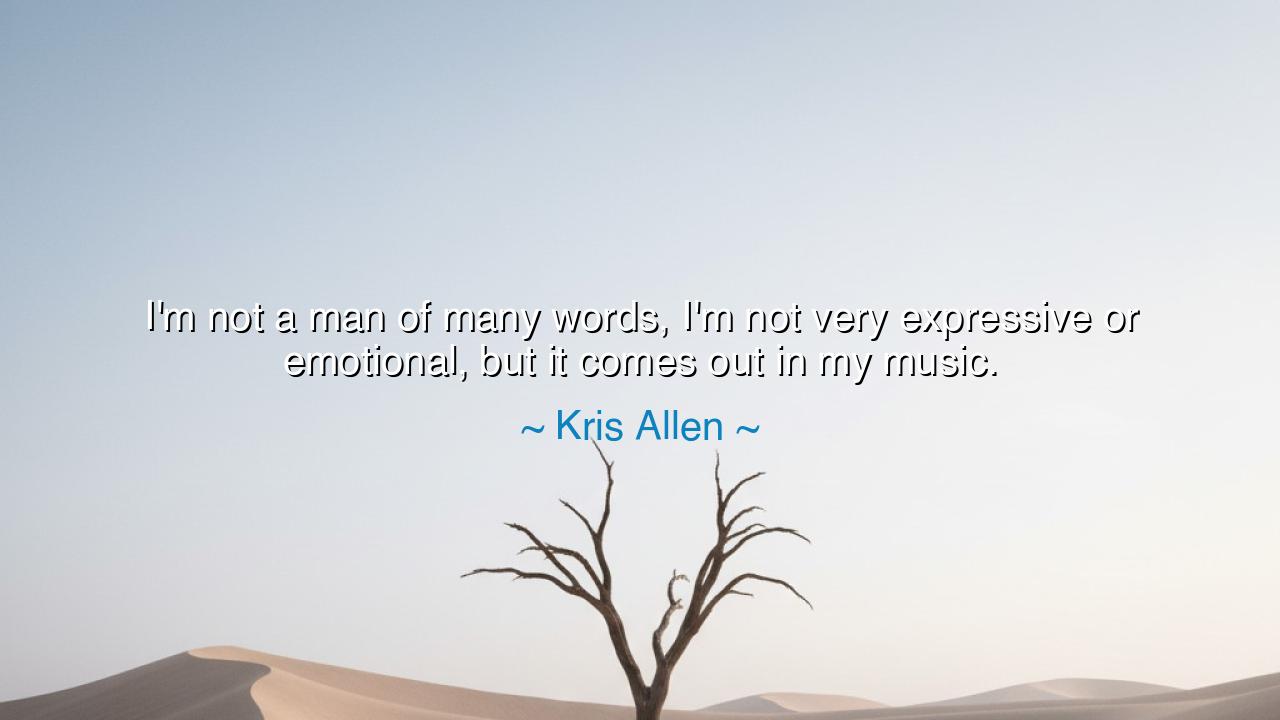
I'm not a man of many words, I'm not very expressive or
I'm not a man of many words, I'm not very expressive or emotional, but it comes out in my music.






The words of Kris Allen, “I’m not a man of many words, I’m not very expressive or emotional, but it comes out in my music,” strike with the quiet force of hidden rivers that carve valleys and shape landscapes unseen. In these words lies the truth that not all hearts speak through the tongue. Some souls are reserved, their voices few, their emotions veiled—but in the realm of music, their silence is transformed into song. What is hidden in the shadows of speech bursts forth in the light of melody.
The ancients knew of such men and women. In the days of Greece, Pythagoras taught that numbers and harmony expressed truths deeper than human words. Likewise, in every culture, there were those who could not pour out their souls in speech, yet found their essence carried through music, dance, or art. For it is not always the spoken word that reveals the heart—sometimes it is the unspoken, the sound that rises beyond explanation, that shows who we truly are.
Consider the story of Frédéric Chopin. A man reserved and frail, his words in conversation were few, his manner quiet and unassuming. Yet when he touched the keys of the piano, the unspoken depths of his soul came alive. Through his nocturnes and preludes, the world heard storms of passion, rivers of grief, whispers of longing. What Chopin could not say, he gave to humanity in sound. Like Kris Allen, his confession was simple: he was not one of many words, but in music, he became infinitely expressive.
This reveals a profound truth about the nature of expression: it does not belong to language alone. The heart has many gateways—some through voice, others through brush and canvas, and still others through strings, drums, and song. Music is the language for the voiceless, the vessel through which emotions too great or too delicate for words find their release. To say, “It comes out in my music,” is to acknowledge that one’s true self is not silent, but merely speaks in another tongue.
In this, we are reminded to look beyond appearances. The quiet man may hold storms within him; the gentle woman may carry symphonies in her silence. To judge a soul only by their words is folly, for their truest voice may be heard elsewhere. As Allen confesses, what seems hidden in conversation may be revealed in music, where the heart is free to sing without fear.
The lesson, then, is twofold. First, seek your own language of truth. If words do not suffice, let your soul flow into music, into art, into creation, into whatever vessel carries your spirit outward. Do not imagine yourself unexpressive simply because your tongue is guarded; you may yet be eloquent in another realm. Second, honor the languages of others. When you hear the song of the quiet man, or see the painting of the reserved woman, receive it as their deepest speech, for it may carry more truth than a thousand spoken words.
Beloved, let us remember: expression is not confined to the tongue. The soul has many voices, and music is one of its purest. Like rivers flowing from hidden springs, what we cannot say often finds its way through melody. So let your song rise, however quiet your speech may be. For in that song, your heart is revealed, and in its revelation, others will find not silence, but the deepest of voices.






AAdministratorAdministrator
Welcome, honored guests. Please leave a comment, we will respond soon